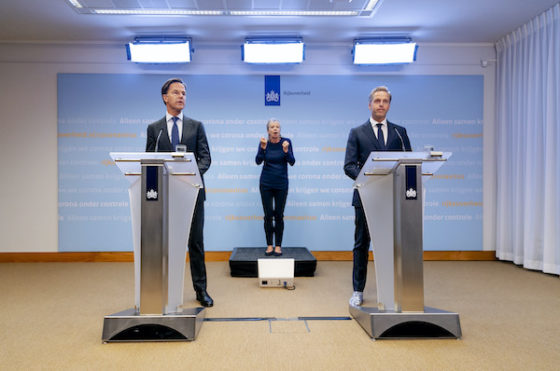Cafes face closure and mayors get curfew powers, as Dutch tackle coronavirus surge


Bars, cinemas and museums identified as centres of coronavirus infection are to be closed for two weeks, and testing is to be introduced at Dutch airports for people from high-risk areas in an effort to stop the increase in coronavirus infections in the Netherlands.
In addition, freshers’ week activities for new students are to be scaled back sharply, and mayors will be able to impose curfews on cafes and bars, prime minister Mark Rutte told a news conference on Thursday evening.
The number of infections in the Netherlands has doubled to 2,588 in the past week, and 601 cases were reported overnight. While this is not a reason for panic, a concerted effort is needed at a local, regional and national level to keep the virus under control, Rutte said.
The 1.5 metre rule is being more widely ignored and fewer people are staying at home to work or if they have symptoms, he said. ‘The virus is an uninvited guest at birthday parties.’
The prime minister also spoke directly to youngsters, who are responsible for a growing proportion of new infections.
‘If too many of you ignore the rules, we will all be stuck inside and you will be a danger to your grandparents and vulnerable people,’ Rutte said. ‘Corona is not over, it is no joke and it is moronic to act as if it is.’
Not critical
New infections have reached a worrying level, but have not yet reached a critical point, Rutte said. ‘If necessary, local and regional measures can be scaled up nationwide, and the role of local public safety chiefs is crucial in this,’ Rutte said, referring to the experiments with masks in Rotterdam and Amsterdam.
Rutte also appealed directly to tourists in Amsterdam to stay away from busy areas.
Mayors, he said, can bring in local face mask requirements in an effort to change people’s behaviour. They can also close busy car parks at the beach. New powers given to mayors include the ability to introduce curfews on cafes, bars and night shops and to ban supporters from local sports events.
These measures can be expanded nationwide if necessary, Rutte said.
The government has also introduced tough rules for this years’ freshers’ week events for new students. In the main, Rutte said, they should be organised online. Physical meetings, which may not involve alcohol and must end at 10mp, must be informal, small scale and directly related to the study or to sport.
Student associations and fraternities, however, have been banned from organising initiation ceremonies for new prospective members.
Regional approach
Health minister Hugo de Jonge highlighted the need for regional approaches to combat the virus. The current situation in the Netherlands shows that the situation in Rotterdam requires a different approach to Drenthe, he said.
As regards foreign holidays, the minister was scathing about people spending time in high risk countries. ‘People don’t have to travel to an code orange area [such as Barcelona and Croatia],’ he said. ‘If they do, they must stay at home for two weeks and undergo a test if they have symptoms.’
In addition, officials will use airline passenger lists to check that people are staying home as required, he said. Testing at Schiphol will also be introduced for everyone flying in from a risky location, but cannot be made compulsory.
De Jonge also confirmed that trials of the controversial government app will begin in Drenthe and Twente on August 12, and the aim is to roll the app out nationwide in September.
Both ministers also stressed that it is up to everyone to obey the guidelines to keep the virus under control. ‘I am not a dictator, and we are giving you the facts,’ Rutte said. ‘In the end it is up to us, as adults in an adult democracy. We all have to stick to the rules.’
New measures announced on August 6:
- Freshers’ week activities are to be held online as much as possible and physical meetings are only permitted to to introduce a sport or an educational programme.
- Cafes, bars and restaurants must use a reservation system and register the contact details of all guests so they can be traced in case of an outbreak.
- If there is an outbreak, the local authorities must close the cafe, cinema, museum or amusement park for 14 days.
- Testing is to be introduced at all Dutch airports for people returning to the Netherlands from high risk areas. In addition, checks based on passenger lists will be introduced to make sure arrivals are staying in quarantine for 14 days.
- Local public safety boards have been given the power to introduce localised measures. These include the right to impose curfews on cafes and night shops, the introduction of face masks, the closure of shopping centres and parks, the power to ban on large events and an the right to scale up policing.
Coronavirus in the Netherlands: what you need to know, update June 25
Coronavirus in the Netherlands: basic rules for everyone (government website)
Coronvirus in the Netherlands: financial schemes for business owners
Thank you for donating to DutchNews.nl.
We could not provide the Dutch News service, and keep it free of charge, without the generous support of our readers. Your donations allow us to report on issues you tell us matter, and provide you with a summary of the most important Dutch news each day.
Make a donation